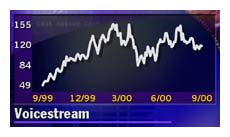|
VoiceStream pleads case
|
 |
September 7, 2000: 5:59 p.m. ET
Wireless provider asks Congress to deny legislation scuttling DT merger
By Staff Writer Tom Johnson
|
NEW YORK (CNNfn) - Less than 24 hours after receiving critical antitrust clearance for its planned $33.87 billion merger with Deutsche Telekom, VoiceStream Wireless took aim Thursday at its next, and perhaps most daunting, regulatory hurdle: trying to convince U.S. legislators to refrain from scuttling the deal.
Testifying before the House Subcommittee on Telecommunications, Trade and Consumer Protection on Capitol Hill, VoiceStream Chairman and Chief Executive John Stanton urged legislators to trust the current regulatory review process on mergers involving companies owned at least in part by overseas governments.
The testimony came during a daylong hearing on legislation seeking to restrict companies more than 25 percent owned by overseas governments from acquiring American telecommunications firms. The legislation was first proposed by U.S. Sen. Ernest Hollings, D-S.C., who has repeatedly said such unions would pose a national security risk.
If passed and signed into law, the bill would effectively bar the Deutsche Telekom/Voicestream union since the German government currently owns a 57 percent stake in Deutsche Telekom (DT: Research, Estimates).
Proposal could impede VoiceStream's growth
Stanton, who characterized his company as "a foreign investment success story," told the committee that passing such legislation would substantially hinder his company's future growth.
"VoiceStream would not be a nationwide wireless carrier today and an aggressive new market entrant if we were barred from raising significant investment capital from abroad," Stanton said in his prepared remarks. "DT will give us the financial backing we need to become a leader in delivering next-generation, broadband wireless to American consumers."
Stanton said without a merger with Deutsche Telekom, which in addition to the merger agreement provided the Bellevue, Wash.-based company with $5 billion in upfront cash to bid on new U.S. wireless licenses, it would leave VoiceStream at a serious competitive disadvantage to industry giants like AT&T Wireless (AWE: Research, Estimates) and Verizon Wireless.
"Despite our potential, VoiceStream today is still an adolescent among adults," he said. "We have to raise money to buy more licenses, build more systems and market our services. Standing alone, we simply did not have the financial resources and scale of our competitors, who are this country's largest providers of local and long distance service and cable service."
 Stanton's VoiceStream signed its merger agreement with Deutsche Telekom in late July, even though Hollings had already draw up his legislation, which specifically would prohibit the U.S. Federal Communications Commission from permitting the transfer of American wireless licenses to Deutsche Telekom or any other German firm for at least a year. Stanton's VoiceStream signed its merger agreement with Deutsche Telekom in late July, even though Hollings had already draw up his legislation, which specifically would prohibit the U.S. Federal Communications Commission from permitting the transfer of American wireless licenses to Deutsche Telekom or any other German firm for at least a year.
As it stands now, the German government would own a roughly 45 percent stake in the combined company. German officials and Deutsche Telekom have repeatedly insisted the government has every intention of reducing its holdings significantly. Reducing that stake to 25 percent, Stanton noted, would take an initial public offering four times the size of AT&T Corp.'s (T: Research, Estimates) recent $10.6 billion offering of its wireless unit.
Investors have remained cautious. Since the acquisition was announced, VoiceStream (VSTR: Research, Estimates) shares have shed nearly 22 percent of their value, while Deutsche Telekom has lost nearly the same amount, reducing the deal's overall value by roughly $6 billion.
FCC, DOJ support VoiceStream
Both the FCC and the Department of Justice, which approved the merger late Wednesday, backed Stanton's position Thursday and assured legislators that proper safeguards were in place.
FCC Chairman William Kennard said his agency had "sufficient authority" to address both national security and domestic competition concerns, allowing for a "rigorous case-by-case review of foreign ownership with sufficient flexibility to address the particular competitive concerns raised by individual transactions.
"Prospectively, I can say we would give close scrutiny to any merger involving foreign government-controlled providers," Kennard said. "Specifically, we would determine whether the proposed merger poses a very high risk to competition, or raises national security or law enforcement concerns."
The Communications Workers of America, an AFL-CIO union that helped block the Worldcom/Sprint merger, also supported VoiceStream's cause.
"We hold that there is room in the U.S. telecommunications market for competition from foreign-owned firms, even firms owned by foreign governments," said Morton Bahr, CWA's president. "The national security implications of foreign ownership are given sufficient scrutiny and protection under already existing regulations."
But others, including subcommittee chairman Rep. Tom Bliley, R-Va., are more hesitant.
At the core of the issue is the United States' decision to sign on to the World Trade Organization's Telecom Agreement, which is designed to keep international borders open to investment and competition.
Bliley, who supported the United States' decision to sign that agreement, said his support was based on the expectation that the WTO members would quickly privatize their telecom monopolies.
"The process of full privatization is taking far too long . . . and the various bills pending in Congress indicate that our patience is running out," he said. "I would note to the Administration and the FCC that, on matters such as this, Congress has demonstrated that it will act if necessary." 
|
|
|
|
|
 |

|

